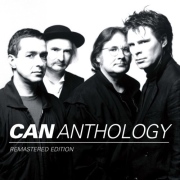 With the temperature dropping, it's time to find someone to keep you warm. Find your hookups with our online dating guide!
With the temperature dropping, it's time to find someone to keep you warm. Find your hookups with our online dating guide!
Anthology
- Rock
- 2007
- Buy the CD
Reviewed by Jason Thompson
()
Like their brethren Faust, Can was at the forefront of the genre, doing what they wanted, how they wanted. But unlike Faust, Can’s experimentalism was more firmly centered in rhythmic, percussive grooves that could seek out and snatch up new listeners across the board. Faust had been about breaking boundaries in a more esoteric way through sound collage, tape fragments, and the occasional “straight” take on its own style (Faust IV, which included the song “Krautrock,” which defined the sound perfectly in its title). As great as Faust’s first clutch of albums was, Can had that edge of genius technical prowess mixed with an uncanny knack of knowing what made up a good, basic, primal rock track that could set anyone into a deep groove.
Founded in 1968 in Cologne, Germany, Can brought together guitarist Holger Czukay, Jaki Leibezeit on drums, keyboardist Irmin Schmidt, second guitarist Michael Caroli, and American musician David Johnson. A second American, “vocalist” Malcolm Mooney, appeared on the group’s first album, Monster Movie, in 1969 (the band’s first attempt at an LP was rejected by its label and not released until 1981, under the title Delay 1968). However, Mooney was a bit of an odd job and was instructed by his therapist to quit the band and go back home. His replacement would be Kenji “Damo” Suzuki, whom the band found busking on a street one afternoon. Suzuki was hired that day, made his live debut that evening, and soon found himself on the group’s second album, Soundtracks.
The fact that Damo improvised the majority of his lyrics was the X factor in Can, and it certainly helped propel the hypnotic majesty of an album such as Tago Mago, whose 18-minute “Halleleuwah” proved that extended rock pieces need not be pompous nor boring to justify their length. Indeed, this aspect was matched two albums later on Future Days, a quieter work that worked just as effectively using the same recipe. A blueprint for the ambient genre, Future Days was the last album to feature Suzuki, and left Can venturing further into that album’s musical direction with fewer vocals.
The rest of the ‘70s found Can bouncing between its experimental roots and a more stylized sound that resulted in albums such as Saw Delight. During this time, Czukay’s role in the group was dramatically reduced; he wound up not even playing on two of the band’s albums before quitting entirely, with the rest of the group following suit a short time afterward. Since then, the band has reunited a couple times, even recording and releasing an album called Rite Time with original vocalist Mooney in the ‘80s.
Anthology is a two-disc affair that splits the band’s music between its earlier and later periods. For novices, it’s a good place to get a taste of what the band was about, but at the same time, Can is one of those groups best heard through its original albums. The fact of the matter is you’re not going to get the same mesmerizing effect from “Halleleuwah” when it’s been chopped down to five and half minutes. Still, it does work better with the later stuff, offering up the best examples of what the band was doing during the years when it began to drift a bit, minus all the chaff.
Nevertheless, any collection offering up “Moonshake,” “Musette,” “Yoo Doo Right,” “Mushroom,” and “Future Days” has a lot going for it. Even in its condensed form, Can’s music still stands as some of the best to grace the airwaves of the late ‘60s and ‘70s. As stated earlier, what the band has done for experimental and modern rock in general is immeasurable. Yet the fact that enough people out there still haven’t experienced the group makes them even more of a tantalizing enigma. Anthology does an admirable job of connecting all the dots and providing an entryway into a far larger experience.
You can follow us on Twitter and Facebook for content updates. Also, sign up for our email list for weekly updates and check us out on Google+ as well.











